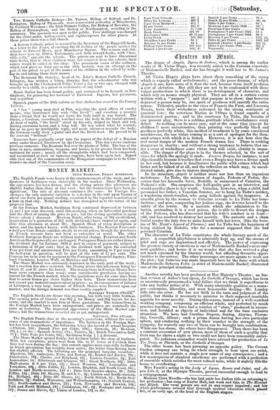Otatrts nub 311itstr.
The drama of Angelo, Tyran de Padoue, which is among the earlier works of hi. Victor Hugo, was recently added to the Parisian riipertoire of Mademoiselle Rachel, and she has brought it with her to St. James's Theatre.
All Victor Hugo's plays have about them something of the stamp which is vaguely called melodramatic ; and the prose dramas, of which Angelo is one, have more of it than the rest, because verse itself produces a sort of elevation. But still they are not to be confounded with those vulgar productions in which there is no development of character, and which rely on means simply physical. They are all to a certain extent written with a " purpose ' ; and that purpose is to show, that however depraved a person may be, one spark of goodness will sanctify the entire nature. Triboulet, pander to the vices of Francis the First, and Lucrezia Borgia, have their wickedness redeemed by the strong sentiment of parental love ; the notorious Marion de r Orme is found capable of a disinterested passion ; and in the courtesan La Tisbe, the heroine of our present play, there is a sublime gratitude which overbalances every defect. As nothing can be more easy, and at the same time (except for children ?) more uninstructive, than painting vice perfectly black and goodness perfectly white, this method of treatment is by some considered mischievous, the one virtue coming in as a sort of apologist for the thou- sand crimes with which it is linked. However, it is not here that the real moral danger of the modern French drama lies. There is nothing dangerous in charity ; and without a strong tendency to believe that un- der a crust of wickedness some virtue may still exist, charity is impos- sible. The danger of the plays is in the themes selected, in the sort of vices for which the apology is made. Luerece Borgia, for instance, is not objectionable because it teaches that even a Borgia may have a divine spark in her soul, but because it familiarizes the public with crimes which had better not be talked of at all, and the reflection on which may, in uncul- tivated minds, give rise to impure imaginings.
In its structure, Angelo is neither more nor less than an ingenious melodrame. La Tisbe, the mistress of Angelo, Podesta of Padua, dis- covers that her favourite lover, Rodolfo, is enamoured of Catarina, the Podesta's wife, She surprises the half-guilty pair in an interview, and would sacrifice them to her wrath. Catarina, however' when a child, had persuaded her father, a Venetian Senator, not to hang La Tisbe's mother, a wandering street-vocalist, who sang ballads against the magnates. A crucifix given by the woman to Catarina 'reveals to La Tisbe her bene- factress; and now, conquering her jealous rage, she devotes herself to the safety of the lovers. By a narcotic which she administers to Ca- tarina, pretending it is a real poison, she is able to thwart the designs of the Podesta, who has discovered that his wife's conduct is at least— odd, and has resolved to destroy her secretly. The narcotic and a sham burial render the lady free to unite herself with her lover, (like the hero- ine of Mr. Hunt's Legend of Florenee,) and La Tisbe has the happiness of being stabbed by Rodolfo, who for a moment supposed that she had poisoned Catarina.
The character of La Tisbe constitutes the whole literary merit of the piece. A coquettish playfulness is admirably kept up, and the storms of grief and rage are impassioned and effective. The power of expressing the greatest variety of emotions is one of Mademoiselle Rachel's most emi- nent qualities ; and hence it is no wonder that she has revived a play not much esteemed by the literary world, but affording favourite oppor- tunities to the actress. The other personages are mere agents to work out the plot ; but Catarina was made important here by the force with which Mademoiselle Rebecca Felix (a sister of Mademoiselle Rachel) illustrated one of the principal situations.


























 Previous page
Previous page